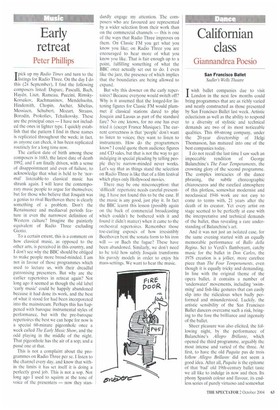Early retreat
Peter Phillips
T pick up my Radio Times and turn to the 'listings for Radio Three. On the day I do this (24 September), I find the following composers listed: Duparc, Pasculli, Bach, Haydn, Liszt, Rameau, Puccini, RimskyKorsakov, Rachmaninov, Mendelssohn, Hindemith, Chopin, Ascher, Sibelius, Messiaen, Schubert, Mozart, Strauss, Borodin, Prokofiev, Tchaikovsky. These are the principal ones — I have not included the ones in lighter type. I quickly establish that the pattern I find in these names is replicated throughout the week; in fact, as anyone can check, it has been replicated routinely for a long time now.
The earliest date of birth among these composers is 1683, the latest date of death 1992, and I am finally driven, with a sense of disappointment and even of failure, to acknowledge that what is held to be 'normal' listenable-to classical music has shrunk again. I will leave the contemporary music people to argue for themselves; but for those who believe that Josquin was a genius to rival Beethoven there is clearly something of a problem. Don't the Renaissance and mediaeval periods feature in even the narrowest definition of Western culture? Imagine the painterly equivalent of Radio Three excluding Giotto.
To a certain extent, this is a comment on how classical music, as opposed to the other arts, is perceived in this country, and I don't see why the BBC should be obliged to make people more broad-minded. I am not in favour of those programmes which used to lecture us, with their dreadful patronising presenters. But why are the earlier repertoires in retreat again? Not long ago it seemed as though the old label 'early music' could be happily abandoned because it had done its work, and the best of what it stood for had been incorporated into the mainstream. Perhaps this has happened with baroque instrumental styles of performance, but with the pre-baroque repertoires the best we can hope for now is a special 60-minute pigeonhole once a week called The Early Music Show, and the odd playing in the middle of the night. That pigeonhole has the air of a sop; and a passé one at that.
This is not a complaint about the programmes on Radio Three per se. I listen to the channel every day, and know that within the limits it has set itself it is doing a perfectly good job. This is not a sop. Not long ago I used to squirm at the tone of voice of the presenters — now they stan
dardly engage my attention. The composers who are favoured are represented by a wider selection from their work than on the commercial channels — this is one of the ways that Radio Three improves on them. On Classic FM you get what you know you like; on Radio Three you are encouraged to hear more of what you know you like. That is fair enough up to a point, fulfilling something of what the BBC once actually set out to do. I even like the jazz, the presence of which implies that the boundaries are being allowed to expand.
But why this downer on the early repertoires? Because everyone would switch off? Why is it assumed that the longed-for listening figures for Classic FM would plummet if classical stations dared to play Josquin and Lassus as part of the standard fare? No one knows, for no one has ever tried it (except France Musique). The current correctness is that 'people' don't want to listen to voices; they want to listen to instruments. How do the programmers know? I could quote them audience figures and CD sales, but that is not the way to go: indulging in special pleading by telling people they're narrow-minded never works. Let's say that as things stand the selection on Radio Three is like that of a film festival which plays only Hollywood movies.
There may be one misconception: that 'difficult' repertoire needs careful presenting. I have not found this to be the case. If the music is any good, just play it. In fact the BBC learnt this lesson (possibly again on the back of commercial broadcasting which couldn't be bothered with it and found it didn't matter) when it came to the orchestral repertoires. Remember those toe-curling exposés of how irresistibly Beethoven bent the sonata form to his iron will — or Bach the fugue? These have been abandoned. Similarly, we don't need to be told how subtly Josquin transforms his parody models in order to enjoy his mass-settings. We want to hear the music.


















































































 Previous page
Previous page